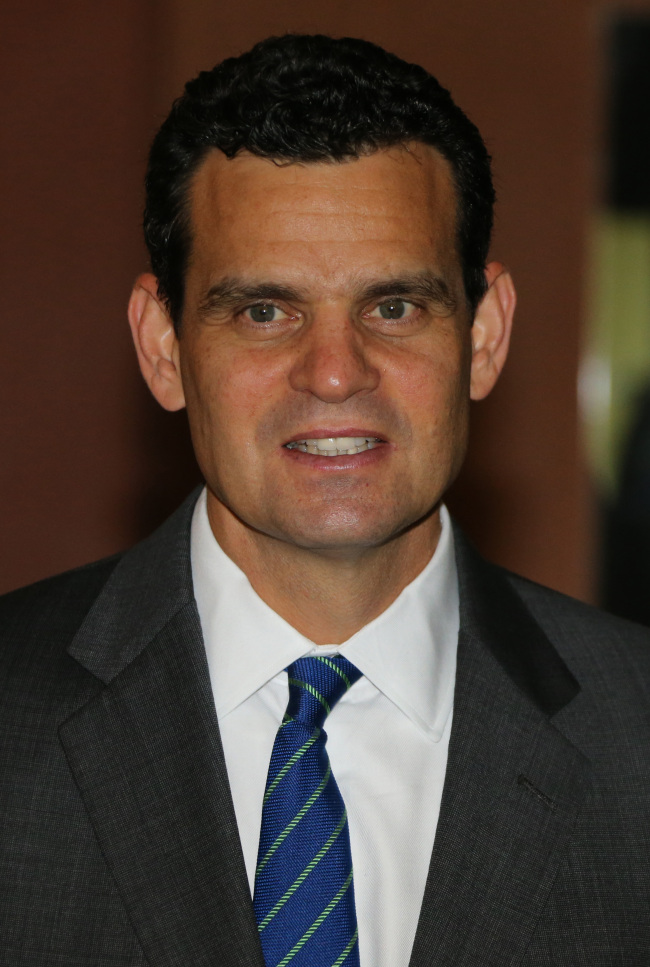S. Korea, U.S. seek tighter imposition of sanctions on North Korea, Iran
By Shin Hyon-heePublished : July 30, 2013 - 20:50
South Korea and the U.S. on Tuesday discussed ways to improve the implementation of sanctions aimed at impeding the nuclear programs of North Korea and Iran.
David Cohen, undersecretary for terrorism and financial intelligence at the U.S. Treasury Department, met with Vice Foreign Minister Kim Kyou-hyun. He also visited Cho Tae-yong, the Foreign Ministry’s top nuclear negotiator and special representative for Korean Peninsula peace and security affairs, and Eun Sung-soo, deputy minister for international economics at the Finance Ministry.
The two sides were expected to chiefly review the worldwide implementation of sanctions including Panama’s recent seizure of a North Korean ship that attempted to covertly carry missiles and other arms in an apparent breach of international resolutions.
David Cohen, undersecretary for terrorism and financial intelligence at the U.S. Treasury Department, met with Vice Foreign Minister Kim Kyou-hyun. He also visited Cho Tae-yong, the Foreign Ministry’s top nuclear negotiator and special representative for Korean Peninsula peace and security affairs, and Eun Sung-soo, deputy minister for international economics at the Finance Ministry.
The two sides were expected to chiefly review the worldwide implementation of sanctions including Panama’s recent seizure of a North Korean ship that attempted to covertly carry missiles and other arms in an apparent breach of international resolutions.

They also discussed cooperation on a new set of U.S. sanctions that came into force on July 1, targeting Iran’s gold and currency trade and auto industry.
“(The two sides) in particular reviewed the implementation of the latest sanctions against Iran and we requested proactive U.S. assistance to minimize the damage for our businesses,” Foreign Ministry spokesman Cho Tai-young told a regular news briefing.
“The two sides also assessed China’s efforts such as regarding the implementation of U.N. Security Council resolutions and agreed to reinforce cooperation with China in the future over sanctions against North Korea.”
At a separate news conference, Cohen said the Panama case represented a “sign of desperation of North Korea” in the face of increasingly crippling sanctions.
In punishment for the North’s third nuclear test in February, the U.N. Security Council in March levied its fourth batch of sanctions including asset freezes, travel bans and clampdowns on illegal sea cargo, luxury buys and “bulk cash” transfers.
“North Korea’s ability to access the international financial system to easily move money to pay for or to get paid for material that it’s either selling or that it’s purchasing for its program has been significantly impaired,” he said.
“North Korea tries to sell conventional weapons where they can. They have only a few countries that are interested in purchasing their conventional weapons ― they’re not very good, the weapons. It’s very hard to pay North Korea.”
After Cohen’s last trip later that month, China joined Washington’s new sanctions on the Foreign Trade Bank, the North’s main foreign exchange institution accused of being “directly tied to” its atomic activities.
Beijing plays a critical role in enforcing sanctions as Pyongyang’s sole major ally and biggest economic patron.
Seoul and Washington are also believed to suspect that Pyongyang is dodging the sanctions by pilfering military equipment through some Southeast Asian ports such as in Hong Kong and Taiwan.
South Korea was the second leg of the American sanctions specialist’s four-nation Asian tour including Japan, Singapore and Malaysia.
But Cohen dismissed the claim that China is cooperating with the U.S., saying it is “taking steps for their own purposes.”
“Whether it’s China or any other country that has exposure to North Korean financial activity, what we have urged is both compliance with Security Council resolutions as well as additional steps to be particularly vigilant to ensure that North Korean illicit financial activity is not allowed in the financial sector,” he said.
“The way to prevent that activity which violates every standard of legitimate financial activity for the banks (is) to be very careful about who they’re doing business with.”
By Shin Hyon-hee (heeshin@heraldcorp.com)



![[Herald Interview] 'Amid aging population, Korea to invite more young professionals from overseas'](http://res.heraldm.com/phpwas/restmb_idxmake.php?idx=644&simg=/content/image/2024/04/24/20240424050844_0.jpg&u=20240424200058)






![[Hello India] Hyundai Motor vows to boost 'clean mobility' in India](http://res.heraldm.com/phpwas/restmb_idxmake.php?idx=644&simg=/content/image/2024/04/25/20240425050672_0.jpg&u=)







